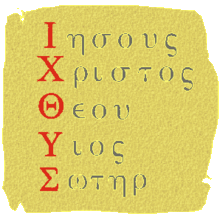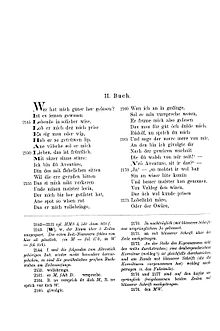Acrostic
![]()
This article is about the word acrostichon. For the band, see Acrostichon.
An acrostic (from the ancient Greek ἄκρος ákros, 'point', and στίχος stíchos 'verse', 'line') is a poem (usually in verse form) in which the beginnings of sequences of words or verses (letters in the case of sequences of words or words in the case of sequences of verses, also initial syllables) read one after the other produce a meaning of their own, for example a name or a sentence. The German term for this literary form is Leistenvers or Leistengedicht.
Acrostics belong to the category of steganography as well as to rhetorical figures. They are to be distinguished from pure abbreviations or strings of words, for example acronyms such as INRI.
Acrostics are widespread in Jewish literature, beginning with the Hebrew Bible. The Lamentations of Jeremiah, except for chapter 5, have an acrostic structure. In some Psalms, the first letters of each of 22 verses follow the series of 22 letters of the Hebrew alphabet (Psalms 9 and 10, 25, 34, 37, 111, 112, 119, and 145). The first four words of Psalm 96:11 (Ps 96:11 EU) contain an acrostic of the name of God, YHWH. In later rabbinic literature, the initial letters of works or verses of songs each indicate the author. This is the case, for example, with the Sabbath hymn Lecha Dodi, in which the initial letters of the first eight stanzas yield the name Schlomo ha-Levi and point to the author Schlomo Alkabez.
The acrostic was popular in ancient, medieval and baroque poetry, for example in Otfrid von Weißenburg (c. 800-870) or Martin Opitz (1597-1639). Paul Gerhardt's song Befiehl du deine Wege is an acrostic from Psalm 37:5, and in the work diu crône by Heinrich von dem Türlin the poet's name is found as an acrostic. An example from modern times is "Lust = life under power" by Elfriede Hablé (1934-2015). Joachim Ringelnatz (1883-1934) took part in the competition for an Olympic anthem with an acrostic under the name Erwin Christian Stolze. The initial letters resulted in his full name.
Acrosticha are also encountered as mnemonic bridges for scientific or everyday contexts. A special case is the abecedarius, in which the initial letters form the alphabet.
A poem in which the final letters form a word or sentence is a telestichon; if this is true of the middle letters, it is a mesostichon. An acrostic is a multiple acrostic or a combination of acrostic and telestic.

Acrostic Iēsoûs Christòs Theoû Yiòs Sōtér (Jesus Christ Son of God Redeemer): I Ch Th Y S (ἰχθύς 'ichthýs' - Fish)

Willehalm acrostic after Rudolf von Ems
Search within the encyclopedia